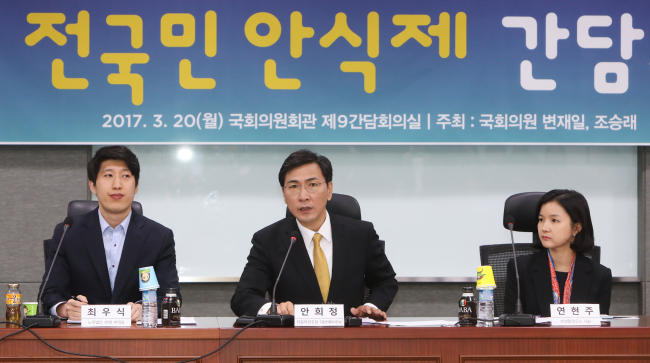[News Focus] An reiterates value of work sabbaticals
By Jo He-rimPublished : March 20, 2017 - 17:40
One of the most talked about and controversial election pledges in the South Korean presidential race so far was proposed by An Hee-jung, a young and center-left candidate from the liberal Democratic Party of Korea.
In a country notorious for long working hours and a rigid work culture, he has suggested a sabbatical leave of one year for all laborers after 10 years of employment.
Having been both rebuked and praised for the idea, the South Chungcheong Province governor Monday hosted a forum solely dedicated to this election pledge at the National Assembly in Seoul.
In a country notorious for long working hours and a rigid work culture, he has suggested a sabbatical leave of one year for all laborers after 10 years of employment.
Having been both rebuked and praised for the idea, the South Chungcheong Province governor Monday hosted a forum solely dedicated to this election pledge at the National Assembly in Seoul.

“Now is the time for us Koreans to embrace a new lifestyle and overcome this overworking society,” An said, defending his vision for less work and a happier life for South Koreans.
He acknowledged that criticism and controversy are inevitable in any push for social reform, but also asked voters not to just dismiss his proposal as unrealistic and to give it serious thought.
According to An, a paid sabbatical leave of one year would be possible without raising taxes. However, society needs to establish a pact to freeze wages for two to three years to secure the funds needed to introduce the system.
The election pledge also includes plans to provide an annual sabbatical month, by increasing paid vacation to 25 days for all laborers, regardless of service years and employment type. Under the system, one would be able to use the vacation days continuously to take a break for a month.
The camp’s policy chief Rep. Byun Jae-il highlighted that the new policy would add some 230,000 jobs and vitalize the domestic market.
Gov. An stressed that the change may look drastic and even unrealistic at first, but is not unachievable.
He cited the past case of late former President Roh Moo-hyun who reduced working hours, changing the nation’s living patterns.
In 2003, the nation’s labor law was revised to reduce statutory working hours to the current 40 hours a week from the previous 44 hours, setting the norm of five working days. Before the change, six working days were ordinary. The number of annual paid vacation days was also revised up then, from eight days to 15 days.
Kim Yoo-sun, a senior researcher at the Korea Labor and Society Institute who was present at the forum, said the revision reduced the nation’s average annual working hours from 2,600 hours to some 2,100 hours by 2013, but the impact of the revision is wearing off.
“In the last presidential election, candidates promised to reduce the nation’s working hours to 1,800 hours but not much progress has been made since then,” Kim said.
According to 2015 data from the Organization for Economic Cooperation and Development, South Korea has the world’s third-longest annual working hours, at 2,113, after Mexico and Costa Rica.
The camp’s policy chief Rep. Byun stressed that the new policy would reflect changing values.
“The older generation that lived the industrial revolution were proud to be called ‘workaholics.’ However, we have lost so many values to reach where we are now,” he said. “The new generation is different and we should provide a new society where they can think and pursue their own life values.”
An previously said citizens “should be able to pursue education, leisure and their lives without having to walk on eggshells around their workplaces.”
By Jo He-rim (herim@heraldcorp.com)







![[Graphic News] More Koreans say they plan long-distance trips this year](http://res.heraldm.com/phpwas/restmb_idxmake.php?idx=644&simg=/content/image/2024/04/17/20240417050828_0.gif&u=)
![[KH Explains] Hyundai's full hybrid edge to pay off amid slow transition to pure EVs](http://res.heraldm.com/phpwas/restmb_idxmake.php?idx=644&simg=/content/image/2024/04/18/20240418050645_0.jpg&u=20240419100350)






![[From the Scene] Monks, Buddhists hail return of remains of Buddhas](http://res.heraldm.com/phpwas/restmb_idxmake.php?idx=652&simg=/content/image/2024/04/19/20240419050617_0.jpg&u=20240419175937)

![[KH Explains] Hyundai's full hybrid edge to pay off amid slow transition to pure EVs](http://res.heraldm.com/phpwas/restmb_idxmake.php?idx=652&simg=/content/image/2024/04/18/20240418050645_0.jpg&u=20240419100350)

![[Today’s K-pop] Illit drops debut single remix](http://res.heraldm.com/phpwas/restmb_idxmake.php?idx=642&simg=/content/image/2024/04/19/20240419050612_0.jpg&u=)